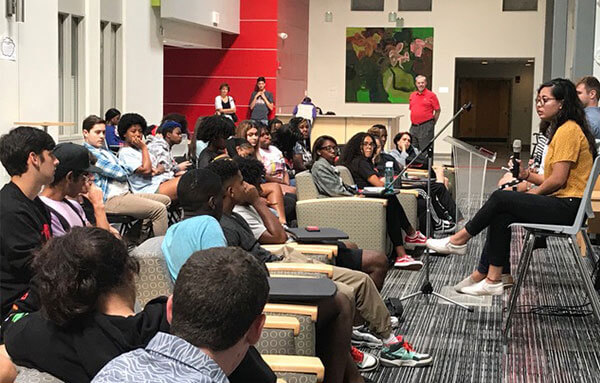
For more information, contact Humanities Center Director Nicholas Ealy, Professor of English and Modern Languages.
The Humanities Center at the University of Hartford embodies a decades-long commitment to the humanities from UHart scholars in literature, languages, history (including art and music history), philosophy, cinema, rhetoric, creative writing and the communication arts.
About Us
The Humanities Center aims to provide greater visibility for the humanities at UHart and to furnish venues for interdisciplinary exchanges across the humanities and the arts, sciences, technology, media, music, psychology, film, philosophy, history, and literature. It was founded in the University’s College of Arts and Sciences through a National Endowment for the Humanities grant.
What We Do
Year-Long Honors Seminars
Each year, the Humanities Center sponsors a year-long honors seminar featuring a topic chosen and taught by a full-time Faculty Fellow. Students of high achievement, from across all programs of study, can apply to take the honors seminar and become a Student Fellow. Student Fellows are eligible to receive a $500 scholarship once accepted to the honors seminar.
Spring Lecture Series
The Humanities Center also sponsors a lecture series that is open to the public each spring and is based on the topic of the honors seminar. Up to four University of Hartford full-time faculty, chosen as Faculty Fellows of the center, speak in the lecture series. The remaining speakers are both on- and off-campus experts on subjects related to that year’s topic.
Honors Seminar Topics
2025-26: AI in Action – The Future of Humans
Led by Assistant Professor of Judaic Studies and History Amy Weiss, this seminar explores how artificial intelligence, often considered to be a twenty-first century innovation, has existed as a discreet field since the 1950s and is based on even earlier models on the ways in which humans have contemplated the many uses of technology as a means of improving their lives. As such, students in the seminar examine historical, social and industry-based developments of AI in order to better understand the ethical and economic implications of this technology. Specific topics covered include industrialization and gender; reality v. deep fakes; AI in academia, the law and medicine; and AI in career trajectories.
- 2024-25: Banned Books and Censorship
Faculty Fellow: Ayelet Brinn, Judaic Studies and History - 2023-24: Fiction, Fabulation, Futurity
Faculty Fellow: Rashmi Viswanathan, Art History - 2022-23: Decolonizing the University: Ethnic Studies through Time
Faculty Fellow: Karen Tejada, Sociology - 2021-22: Fearing the Unknown – Irrationality, Anti-Politics, and Conspiracy Theories
Faculty Fellow: Marco Cupolo, Hispanic Studies - 2020-21: Lights, Camera, Activism!
Faculty Fellow: Mala Matacin, Psychology - 2019-20: Transversing Gender, Race, and Class
Faculty Fellow: Kristin Comeforo, Communication - 2018-19: Evidence in a Post-Truth World
Faculty Fellow: Lauren Cook, Cinema - 2017-18: The Secular and the Spiritual
Faculty Fellow: Richard Freund, Judaic Studies - 2016-17: Our Monsters, Ourselves
Faculty Fellow: Amanda Walling, English and Modern Languages - 2015-16: Remembering 9/11
Faculty Fellow: Sarah Senk, English and Modern Languages
2025-26 Student Fellows
- Katrina Baran (Biomedical Engineering – CETA)
- Ame Beaulieu (Accounting – Barney)
- Meaghan Bucklin (Illustration – HAS)
- Eva Geiger (Communication – A&S)
- Sequoia Hornsby (English – A&S)
- Rusha Mataj (Biochemistry – A&S)
- Nora Miller (Criminal Justice/Politics & Government – A&S)
- Patrick Morrow (Architecture – CETA)
- Avianni Nieves (Communication/DMJ – A&S)
- Natalia Ortiz-Villacorta (Actor Training – Hartt)
- Evan Redo (Prosthetics – ENHP)
- Nadia Ribeiro (Cinema – A&S)
- Max Rosenbush (Judaic Studies – A&S)
- Morgan Sibley (Exercise Science – ENHP)
- Chelsea Smith (Political Science/Business – A&S/Barney)